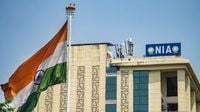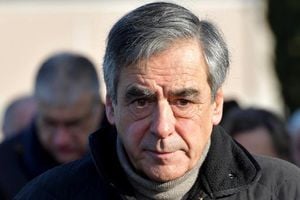The recent terror attack in Pahalgam, Jammu and Kashmir, has sparked a wave of condemnation and heightened tensions between India and Pakistan. On April 22, 2025, a brutal assault claimed the lives of 26 individuals, primarily tourists, leaving the nation in shock and mourning. In the aftermath, FBI Director Kash Patel expressed his condolences and reaffirmed the United States' support for India in combating terrorism, highlighting the global threat posed by such acts.
Patel's statement, made via social media, emphasized the need for solidarity against terrorism. He stated, "The FBI sends our condolences to all the victims of the recent terrorist attack in Kashmir -- and will continue offering our full support to the Indian government. This is a reminder of the constant threats our world faces from the evils of terrorism. Pray for those affected." This sentiment was echoed by U.S. President Donald Trump, who spoke with Indian Prime Minister Narendra Modi the day after the attack, condemning the violence and expressing strong support for India's efforts to bring the perpetrators to justice.
In a public meeting in Bihar, Modi promised to “identify, track, and punish” all terrorists involved in the attack. He declared, "India will pursue them to the ends of the earth. India's spirit will never be broken by terrorism." The Prime Minister's words resonated with a nation grieving the loss of innocent lives, and he assured the victims' families that justice would be served.
The Pahalgam attack has led to significant diplomatic and military actions from India. New Delhi expelled Pakistani military attaches and suspended the Indus Waters Treaty of 1960, a critical water-sharing agreement. Furthermore, the Attari land-transit post was shut down as a punitive measure against Pakistan. In response, Islamabad threatened to suspend the Simla Agreement and other bilateral accords, further straining the already tense relationship between the two nations.
As investigations into the attack progressed, the National Investigation Agency (NIA) took over the case from local authorities. The NIA, led by a Deputy Inspector General, began a thorough examination of the attack site and collected forensic evidence. The agency's focus is on operatives affiliated with Pakistan-based terror organizations, including Hizbul Mujahideen, Lashkar-e-Taiba (LeT), and Jaish-e-Mohammed (JeM). Reports indicate that at least three individuals are linked to Hizbul Mujahideen, eight to LeT, and three to JeM.
Among the identified suspects are Zubair Ahmed Wani, the Chief Operational Commander of Hizbul Mujahideen, and Haroon Rashid Ganai, both of whom have a history of involvement in terrorist activities. The NIA's investigation aims to dismantle the support networks that facilitate cross-border terrorism, with security forces intensifying operations across South Kashmir.
In a show of force, Indian security forces have conducted extensive raids, demolishing the homes of alleged militants involved in the attack. Reports indicate that at least nine houses have been destroyed, including those belonging to individuals suspected of planning the attack. The crackdown has raised concerns about the potential for further violence and retaliation.
On the night of April 26-27, the situation escalated further as Pakistani army posts initiated unprovoked small arms fire across the Line of Control (LoC). The Indian Army responded effectively, indicating a precarious military standoff between the two nations. This escalation comes amid accusations from Pakistan that India has violated water-sharing agreements by releasing water into the Jhelum River without prior notification, creating panic in areas of Pakistan-occupied Kashmir.
In a surprising turn, the Resistance Front (TRF), a group linked to the attack, denied its involvement, calling such claims a false attribution aimed at maligning Kashmiri resistance. This denial adds another layer of complexity to an already volatile situation, as Pakistan's Defence Minister Khawaja Muhammad Asif called for an international investigation into the attack.
As global leaders express their solidarity with India, the ongoing conflict between the two countries continues to evolve. Modi's recent address during his Mann Ki Baat program reiterated the collective anger and grief felt by Indians. He assured citizens that the perpetrators would face the strictest punishment and emphasized the importance of unity in the fight against terrorism.
In the wake of the Pahalgam attack, the Indian government has made it clear that it will not tolerate acts of terrorism. The swift actions taken against Pakistan, including the suspension of the Indus Waters Treaty and the expulsion of military attaches, signal a hardening of India's stance. As tensions mount, the need for dialogue and resolution becomes increasingly critical.
In conclusion, the Pahalgam terror attack serves as a grim reminder of the persistent threat of terrorism in the region. The international community's response, coupled with India's decisive actions, highlights the ongoing struggle against extremist violence. As investigations continue and diplomatic tensions rise, the hope for peace remains fragile, with the specter of further violence looming large over the subcontinent.




